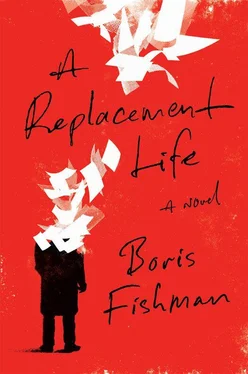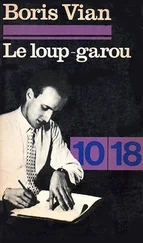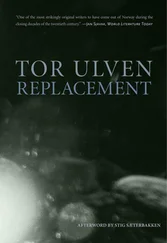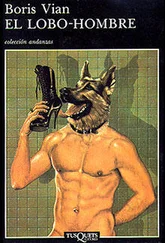“This is a hallway, not a dance club!” someone farther back in line said half jokingly.
“Why don’t you let the youth speak, cow!” Lazar said with startling vigor. And then, under his breath, “If you lost some weight, you wouldn’t have trouble squeezing past.”
Vera and Slava laughed. “He wants you to have it, that’s all,” she said.
“Do you have to go?” Slava blurted out.
She thought about the answer but not long. “There’s a bar close to where I live,” she said. She gave him the name. “I’ll wait for you there.”
The bar had bordello-red velvet couches and multiple television screens showing sports. They were the only ones there; the bartender, a young woman wearing an olive-green tank top and leather bands on both wrists, was flipping through a magazine.
“What are you thinking about?” Vera said. She sat in a high-backed banquette, her back arched, the edge of her skirt lapping her knees.
“Someone I wrote a letter for,” Slava said. “He wasn’t there tonight.”
“You spend a lot of time with old people now,” she said.
“You said they are lonely,” he said.
“Let’s bring you back to young-people time,” she said. “Let’s dance.”
“Here?” he said. There was a sneering song coming out of the speakers.
“Wait,” she said. She rose and walked over to the bartender. A moment later, the music changed.
“I think she wanted to close,” Slava said when Vera returned.
“You just need the charm,” Vera said.
“You have an effect on men and women both.”
“Stop talking, Slava. Let’s go.”
The song was slow. In a blue something. Slava’s arms slid neatly into a crevice in the small of Vera’s back. The bartender lifted her eyes, winked at Slava, and returned to her magazine. It wasn’t the kind of bar where people danced.
“Do you remember,” Vera said, “when you smacked your face in the window in Vienna?”
Slava tried to remember, but all he could recall about Vienna was the synagogue, cobblestones, Grandfather. All the other slots in the slide projector showed empty.
“We were just walking around,” she said. “You stopped because you saw these kitchen pots in a store window. They were very beautiful, with designs on the side in bright color. You started walking toward them because I think you wanted to touch them. And then — bam!” Vera’s palm met Slava’s forehead softly. “The window was so clean, you didn’t understand there was a window there.”
They both laughed. Slava wanted to remember. He liked being the person who gave her such satisfaction.
She leaned into Slava’s chest. “You are so serious now,” she said, so quietly that perhaps she didn’t wish him to hear.
“That’s not true,” he said.
“Prove it you are not,” she said, looking up at him.
He pulled away, lifted her, and twirled her in his arms, her skirt making an accordion in the air. She yelped. The bartender looked up and smiled again.
They walked to Vera’s apartment. The streetlights ticked and buzzed, playing with one another in the cool night. It was practically September. In this neighborhood, Slava had never walked to a home at such a late hour, only from. In the last month, he had spent more nights around here than in the preceding two years, but always he left well before now.
Slava remembered only one thing clearly about Vienna, from the afternoon he had peeked inside the Vienna synagogue from behind Grandfather’s pants leg, Austrians streaming past them. How could they walk by so indifferently, Slava had thought, if they once wished to exterminate all the people inside? Slava felt shame for the worshippers. He didn’t want to look at them because it would have connected him with their destruction. That was when Grandfather made them disappear with a release of the door, a finger in his temple to say they were crazy. All the knots in Slava’s stomach gave way.
The Gelmans managed to leave the Soviet Union only because all sides had agreed to pretend that they were going to Israel. The Soviet government wouldn’t release Soviet citizens directly to the United States. But it would release its Jews to Israel, “family reunification” being less humiliating to the USSR as the refugees’ reason for emigration than discontent with socialism. If there was no family in Israel, as there usually wasn’t, it was manufactured. Scribes popped up to supply people like the Gelmans with an Aunt Chaya in Haifa and a Cousin Mumik in Ashdod. These invented Chayas and Mumiks filled out affidavits in the scribe’s hand requesting the Soviet government to release their relatives. The Soviet visa office quietly acquiesced.
Intermediary countries — Austria, Italy — facilitated the deception; after all the invention, the refugees couldn’t very well fly from Sheremetyevo to JFK. So the Gelmans took the long, slow train to Vienna, a month later another to Italy, several months later the airplane to New York. At every step, everyone had lied about everything so the one truth at the heart of it all — that abused people might flee the place of abuse — could be told.
Grandfather was already a liar — this kind of liar — when he twirled his finger in his temple that afternoon in Vienna, and Slava was young enough to understand such lies as a better kind of truth. It wasn’t until they’d come to America that the truth started to mean exactly what was said and not something else. The calculus had changed in America. Here you could afford a thirty-two-inch television on a doorman’s salary, as Bart at the front desk kept finding ways to mention. Here you could afford to be decent.
If you find yourself on one of the lower-alphabet avenues in South Brooklyn —Avenue U, Avenue Z — you are sure to come across a furniture emporium. Russian-owned, Europe-minded. Collezione Eleganza, La Moda, and, to reassure those concerned that Europe-minded means Europe-priced, Discount European Furniture Warehouse. Inside, you will find leather couches with armrests wide enough to serve as ottomans, in elusive shades of tan and ocher. You will find lacquered tables with tapered legs and faux-sapphire inlays; paintings in every color but primary; and curves, everywhere curves.
Vera’s bookshelves curved. Her lampshades curved. Her fridge would have curved if only the maker obliged. The balcony, where Vera’s tour of the apartment ended, was covered with synthetic grass and additional leather furniture.
“It doesn’t get ruined when it rains?” Slava asked as they surveyed the neighboring homes, the occasional clothesline breaking the baked tar of the roofs. The ground floors were for dirt, exhaust, and cheap living. It was soundless and cool up here in the clouds.
“I cover it with plastic every morning before I go to work,” she said.
“But if you go away somewhere?”
“I don’t go anywhere.”
Out of her intimidating freezer, Vera withdrew an ice-encrusted bottle of vodka. The ice on the bottle sparkled like diamonds, and the clear liquid poured from it thickly, a clear honey.
They clinked, downed in one gulp, and gnawed on frozen strawberries while listening to the quiet. Slava stood at the dark window. On the other side, Brooklyn made the sounds of sleep. The early morning and the night, those were his favorite times, before everything began and after it ended.
“I can’t tell,” he said, “if this is real or it’s because you and I cut vegetables out of construction paper together in Italy. Because you remember things about me that even I don’t remember. Because when I say ‘Grandfather,’ you think the same thing I think.”
“That is what means it is real,” she said from the sectional.
“We cut vegetables out of construction paper and made our parents pay in real money. Your grandfather with the secondhand market in Italy. My letters, your press conference. All we do is lie. Germans make Volvos, at least. We lie.”
Читать дальше











